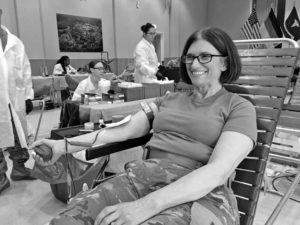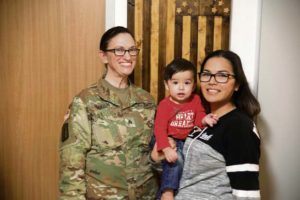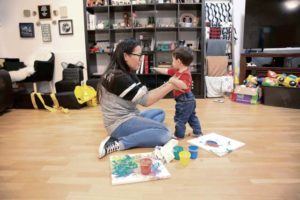by Stacy Sanning
Donor Recruiter and Public Affairs Officer, Armed Services Blood Program – Europe

Almost exactly one year after her son was born, Clarissa Masquef, searched out an Armed Services Blood Program blood drive at the Kaiserslautern Military Community Center on Ramstein to donate the gift of life Feb. 25.
The ASBP holds all blood drives on U.S. military installations overseas, with plenty of support from sponsoring units, local American Red Cross chapters and other organizations.
Masquef knew she had to donate blood because someone else’s donation saved her life after her son was born.
After a challenging pregnancy and an even more difficult labor and delivery, Masquef lost a lot of blood trying to deliver her son, Jaxon, and had to have an emergency cesarean section. The Mother Baby Unit staff at Landstuhl Regional Medical Center told her that she would need a blood transfusion. She ended up receiving two units of blood, donated by two different people.
“Before she went in for the C-section, it was really nerve racking because you could see she had lost a lot of blood, it was all over the floor,” said Clarissa’s husband, Air Force Staff Sgt. Corey Masquef, a Pavement and Equipment Craftsman with the 435th Construction and Training Squadron at Ramstein.
“It felt better to know that there was blood available on the spot for Clarissa when she needed it,” Corey said.
The transfusions helped Clarissa recuperate enough to be able to leave the hospital with baby Jaxon.
Thanks to the blood someone donated, Jaxon is growing up with his mother at his side. Clarissa gets to raise her son, run 5K races with him, create beautiful art for her family and their community, work as a bartender with the 86th Force Support Squadron on Ramstein and move forward on her goal to earn a degree in psychology.
“It was kind of like when you fall down and someone is reaching a hand out to help you up,” said Clarissa. “I am truly grateful to the two people who donated blood.”
Clarissa had no idea that while in the LRMC Mother Baby Unit last year, she came very close to meeting one of the donors whose blood helped her.
Without donors, there would be no blood for patients.
Army Sgt. Paula Darbin has been donating blood since she was 16 years old, never knowing where it went, but happy to help.
When Darbin tragically lost her 17-year-old daughter Caitlin in a 2015 car accident, the family agreed to donate her organs. Caitlin’s lasting legacy was a gift for another.
Just two years later, her son Justin was stabbed and received three units of blood during his treatment.
“It came full circle. I knew I had to keep donating because someone donated for my son,” said Darbin. “I look at Justin now and I know he would not have made it without getting the blood he needed.”
As a licensed practical nurse in the LRMC Mother Baby Unit, Darbin saw how mothers and babies benefit from blood donated at ASBP blood drives. She said she never imagined that the blood she donated might come right back to someone in this community, let alone a patient getting care where Darbin worked.
“I always thought it might go to someone downrange,” Darbin said.

Just days after she moved from the Mother Baby Unit to a new position in the LRMC Education Division, Darbin’s blood was sent to the Mother Baby Unit for Clarissa.
Darbin eventually got to meet Clarissa in late March and see firsthand how her blood helped a fellow mother.
“To actually get to meet Clarissa, it gave a sort of closure to everything that happened to my son and my daughter,” said Darbin. “It’s even more special when you get to see someone who was helped because of your donation. It’s like we are all paying it forward.”
Darbin’s daughter’s organ donation helped someone else, donated blood helped her son, and Darbin’s donated blood helped Clarissa and her family.
Continuing the circle of selflessness, Clarissa’s February blood donation was shipped to the U.S. Naval Hospital in Naples, Italy. The Armed Services Blood Program – Europe, based out of Landstuhl, provides blood to the Naples military hospital to help emergency and surgery patients or to go on further in support of the U.S. Naval Forces Europe-Africa and Navy’s Sixth Fleet.
Continue paying it forward
Clarissa emphasizes the importance of donating blood and helping the community. “It helps not only service members, but family members too,” she said. “You can save anybody. You can save him [gesturing to her son Jaxon], me, your neighbors or coworkers.”
After receiving blood that helped her, Clarissa said she knew she wanted to donate blood as soon as she was eligible. Potential donors have to wait one year after receiving a blood transfusion.
Clarissa had always wanted to donate blood but wasn’t able to when she was active duty in the Army because she was under the minimum weight requirement.

“This was my first time being eligible and it felt really nice to be able to this time,” Clarissa said. “I feel grateful for the people who do this regularly.”
The need for blood is constant. From military hospitals like LRMC who require blood for transfusions to the military units taking units of blood for live-fire exercises and real-world missions, ample supplies of blood enable medical readiness for emergency situations.
Normally, whole blood donors can give blood every 56 days, or every eight weeks. In her case, Clarissa will need to wait one year from her most recent overseas tattoo. Knowing this, Clarissa made sure to donate blood before her tattoo. Because so many people in Europe are not eligible to donate blood, it is even more important for those who are eligible to take the step to donate and help others. (See below for eligibility criteria)
“If you’re eligible to donate, I would highly advise you to do it,” said Clarissa. “That’s the result,” pointing to her son Jaxon toddling through the living room.
“If you can donate do it, because we all have to rely on each other,” Corey added.
ASBP collects blood from the military, for the military
Donated whole blood, plasma and platelets are processed by the Armed Services Blood Bank Center team in Landstuhl and then sent around the world to tri-service military medical facilities as well as out to military units in case of medical emergencies.
Eligible donors can help the ASBP meet these needs by donating blood, platelets or plasma but anyone can help by sponsoring a blood drive, volunteering at a blood drive or simply encouraging others to donate blood.
For more information about donating blood or sponsoring a blood drive in your unit or organization, contact the Armed Services Blood Program-Europe by phone at DSN 590-5885 or 06371-9464-5885 or by email at usarmy.donateblood-europe@mail.mil. Find all the ASBP-E blood drives at www.facebook/ASBPeurope or at www.militarydonor.com, click Locate a Blood Drive, then click Non-U.S. Drives Near Landstuhl, Germany.
CAN I DONATE?
Many people can donate blood, platelets and plasma to help save lives! You can probably donate if:
– you are 18 or older, weigh at least 116 pounds and have been free of cold/flu symptoms for three days.
– you have not received a tattoo overseas in the past 12 months (tattoos in most U.S. states require a one week wait, overseas and non-FDA regulated states require a 12-month wait).
– you have not lived in Western Europe (including Germany) for more than 5 years total since 1980.
– it has been more than 12 months since you were last in Iraq, Afghanistan, Djibouti or Niger.
More details at www.militaryblood.dod.mil/donors/can_i_donate.aspx or call the Armed Services Blood Program – Europe at DSN 590-5885 or CIV 06371-9464-5885.







